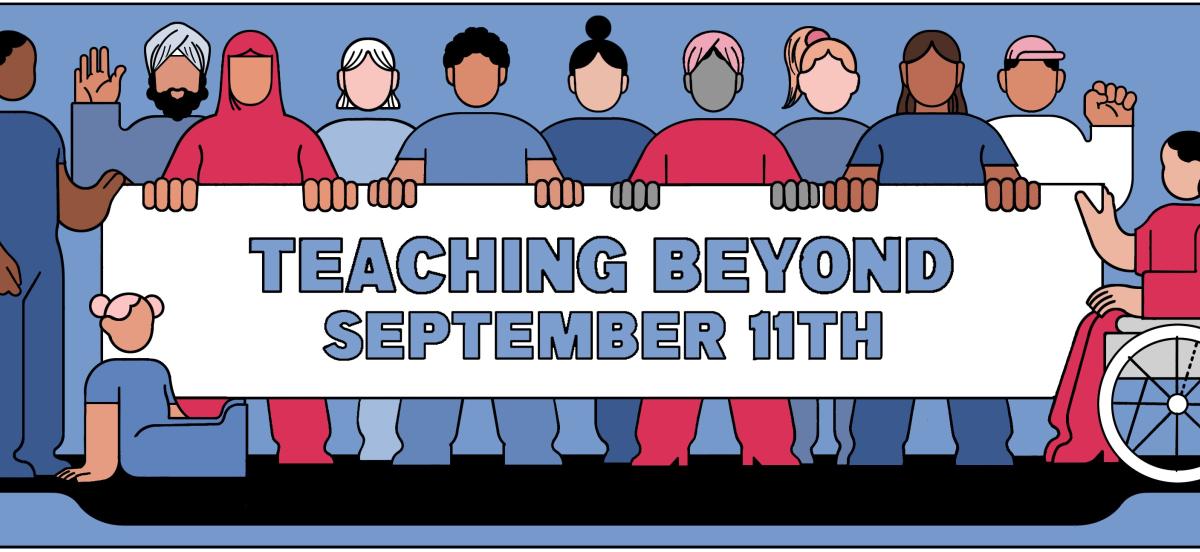Advancing Peacework in the Shadow of 9/11

Artwork By Nadia Hafid
Details
Haverford students, faculty, and alumni joined to learn from professors advancing engaged and applied scholarship in the US and around the world, with common themes of peace and healing moving beyond the tragic events of September 11th.
On September 9th, 2022, students, faculty, and alumni gathered in Lutnick library to learn from individuals who have worked to advance healing and understanding since 9/11. The Center of Peace and Global Citizenship (CPGC) hosted Professors Kelly Denton-Borhaug, John E. Katsos ‘07, and Ameena Ghaffar-Kucher who all talked about their unique work in academia, and how it was influenced by 9/11.
Kelly Denton-Borhaug is a professor in the Global Religions Department at Moravian University in Bethlehem, PA, where she directs the Peace and Justice Studies Minor. Denton-Borhaug discussed her research around Christian doctrine, U.S. militarization and war, specifically focusing on the concepts of war culture and moral injury. In addition to her research and public writing on these topics, Denton-Borhaug works with veterans groups focused on healing. As a result, the audience included veterans who came to campus to attend the event. Denton-Borhaug’s presentation continuously returned to her overarching question, “Why do US citizens seem to be mostly unaware and or unconcerned regarding the violence of their own war culture?”.
Following Denton-Borhaug was alumnus John E. Katsos ‘07. Katsos is Associate Professor of Business Ethics, Law, and Social Responsibility at the American University of Sharjah and Research Affiliate at Queen’s University Belfast. Katsos recalled the impact 9/11 had on him as a teenager living in New York City, and how moving to Haverford College provided him with opportunities to dialogue with faculty, staff, and other students in meaningful ways that never dishonored but also moved beyond his initial rage. Katsos went on to discuss his research on businesses in conflict zones. Published in the Harvard Business Review and several other locations, his work considers the question: “What role do businesses play in sustaining or expanding peace?”.
Lastly, Ameena Ghaffar-Kucher, Senior Lecturer at the University of Pennsylvania’s Graduate School of Education and Director of the International Educational Development Program, discussed increases in the surveillance state and hate crimes as a result of 9/11, and how these events led her to co-found the Teaching Beyond September 11th Curriculum Project, where she is team lead and curriculum director. Ghaffar-Kucher presented a timeline of cultural and policy changes from 2001 to the current day, depicting events specifically in the United States that have a direct correlation to September 11th.
Each speaker concluded their presentation with advice for Haverford Students in attendance, sharing unique pieces of wisdom about how to approach research, utilize skills students already hold, and how to deal with pushback and rejection in academia.
The panelists were invited to take part in a Q&A session facilitated by Sarah-Jane Koulen, Assistant Professor of Peace, Justice, and Human Rights. They expanded on how students should engage in research opportunities. When discussing engaged and applied research, Denton-Borhaug said “Build those skills now deeply, thoroughly. They are going to serve you for anything you want to research in the future…These skills are indispensable.” Denton-Borhaug continued to offer a second piece of advice: “Be ready for criticism: some people are going to criticize you when you do engaged and applied research for not being objective and you need to have a response for that.” Katsos agreed, saying, : “The people who think they are objective are never objective. The people who don't agree with you - you just have to brush it off and keep doing the good work you are doing”. Ghaffar-Kucher concluded the session by urging students to continue to engage in conversations about flawed systems, constantly questioning and discussing what systems are still in place that are furthering systemic injustices.
As the event closed, Koulen turned the microphone over to CPGC Executive Director Eric Hartman, who clarified that Haverford College students have opportunities to undertake engaged and applied research that advances peace, justice, inclusion, and sustainability. He mentioned that this sometimes occurs through CPGC Summer Fellowships, such as through the partnership among a Guatemalan Human Rights group, the College Libraries, and the CPGC - and that it also occurs through student applications for community-engaged learning funding. “It is through the generosity of alumni that we are able to support Haverford students in internships and engaged learning of this kind,” noted Hartman, who also said that alumni generosity and commitments to peace made the day’s events possible.



